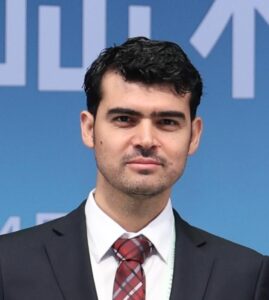
- General Information
- Symposia
- Atomic Layer Deposition
- Biomaterials and polymers
- Characterizacion and metrology
- Luminescence Phenomena
- Microelectronics and MEMS
- Nanostructures
- Plasma and Vacuum
- Renewable Energy: Materials and Devices
- Semiconductors
- Tribology, Surface and Interfaces
- Theory and Simulation of Materials
- Thin Films
- Science Outreach
- Plenary Lectures
- Short Courses
- Book of Abstracts
- General Program
- Agenda
- Poster Session
- Oral Session
- Congress Registration
- Abstract Submission
- Committees
- Fees
- Awards/Grants
- Athletic race 2025
- Sponsors and exhibit
- Hotel Accomodation
Machine Learning in condensed matter: from molecular systems to materials

Dr. Huziel Sauceda
Instituto de Física
Universidad Nacional Autónoma de México
Machine learning (ML) encompasses a wide range of algorithms and models, which have been prominently applied to condensed matter physics. Some applications range from atomistic simulations, generative quantum and classical distributions, physicochemical properties learning, among many others. In this talk, we will present some examples of how ML models have advanced our understanding of molecular systems and their complex interactions. In particular, we will focus on how combining machine learned force fields (MLFFs) and quantum dynamics, reveals the intricate nature of molecular systems and materials, as well as evince the limitations of many electronic structure methods. Furthermore, we will show how MLFFs enable the study of materials under realistic simulation conditions to generate predictive observables comparable with experimental results.
Dr. Huziel E. Sauceda earned his Ph.D. at the Institute of Physics of the National Autonomous University of Mexico (IFUNAM), where he specialized in computational nanoscience. He later carried out a postdoctoral stay at the Fritz Haber Institute of the Max Planck Society in Berlin, leading the development and application of machine learning models in materials science.
Subsequently, he joined the Machine Learning and Big Data group at the Technical University of Berlin, where he served as a group leader until his return to IFUNAM in late 2021.
He currently leads the “Machine Learning for Simulations” research group at IFUNAM, which includes undergraduate and graduate students. His research focuses on the development of machine-learned interatomic potentials, the learning of classical and quantum propagators, quantum molecular dynamics simulations, and the application of machine learning to many-body quantum systems and battery physics.
Congress Registration
Early Bird Payment
August 31, 2025
Abstract Submission
Abstract submission deadline
June 22, 2025
Key Dates
Abstract Submision Deadline:
June 22, 2025
Intercovamex Award Best PhD and Master´s Thesis:
August 31, 2025
Student grant application deadline:
July 4, 2025
Franscisco Mejia Lira Award:
August 31, 2025
Early Bird payment:
August 31, 2025
